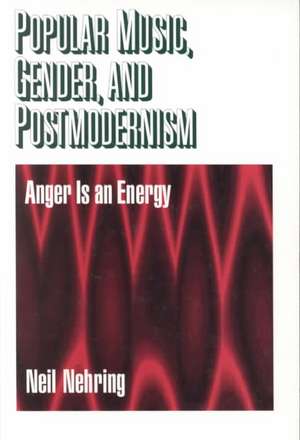Popular Music, Gender and Postmodernism: Anger Is an Energy
Autor Neil R. Nehringen Limba Engleză Paperback – 14 apr 1997
| Toate formatele și edițiile | Preț | Express |
|---|---|---|
| Paperback (1) | 611.74 lei 6-8 săpt. | |
| SAGE Publications – 14 apr 1997 | 611.74 lei 6-8 săpt. | |
| Hardback (1) | 845.51 lei 6-8 săpt. | |
| SAGE Publications – 7 mai 1997 | 845.51 lei 6-8 săpt. |
Preț: 611.74 lei
Preț vechi: 719.69 lei
-15% Nou
Puncte Express: 918
Preț estimativ în valută:
117.07€ • 120.94$ • 97.43£
117.07€ • 120.94$ • 97.43£
Carte tipărită la comandă
Livrare economică 26 martie-09 aprilie
Preluare comenzi: 021 569.72.76
Specificații
ISBN-13: 9780761908364
ISBN-10: 0761908366
Pagini: 235
Dimensiuni: 154 x 229 x 16 mm
Greutate: 0.4 kg
Ediția:1
Editura: SAGE Publications
Colecția Sage Publications, Inc
Locul publicării:Thousand Oaks, United States
ISBN-10: 0761908366
Pagini: 235
Dimensiuni: 154 x 229 x 16 mm
Greutate: 0.4 kg
Ediția:1
Editura: SAGE Publications
Colecția Sage Publications, Inc
Locul publicării:Thousand Oaks, United States
Cuprins
PART ONE
No Respect for Suffering: An Introduction to Postmodernism
The Vicious History of Aesthetics
Romanticism, Modernism and Postmodernism on Mass Culture and<i> Ressentiment
Collaborating with the Oppressors
Postmodern Academics on Music
Kurt Cobain Died for Your Sins
Postmodernism in Music Journalism
PART TWO
Emotional Rescue
Feminist Philosophy on Anger
The Post-Postmodern Voice
Emotion and Writing about Music
The Riot Grrrls and Carnival
No Respect for Suffering: An Introduction to Postmodernism
The Vicious History of Aesthetics
Romanticism, Modernism and Postmodernism on Mass Culture and<i> Ressentiment
Collaborating with the Oppressors
Postmodern Academics on Music
Kurt Cobain Died for Your Sins
Postmodernism in Music Journalism
PART TWO
Emotional Rescue
Feminist Philosophy on Anger
The Post-Postmodern Voice
Emotion and Writing about Music
The Riot Grrrls and Carnival
Descriere
The migration of cynical academic ideas about postmodernism into music journalism are traced in this book. The result of this migration is a widespread fatalism over the ability of the music industry to absorb any expression of defiance in popular music.
The book synthesizes a number of fields: American and British academic and journalistic music criticism; aesthetic and literary history and theory from romanticism through postmodernism; alternative music such as feminist punk and grunge; political economy, which has fueled the obsession with commercial incorporation; and subcultural sociology.











